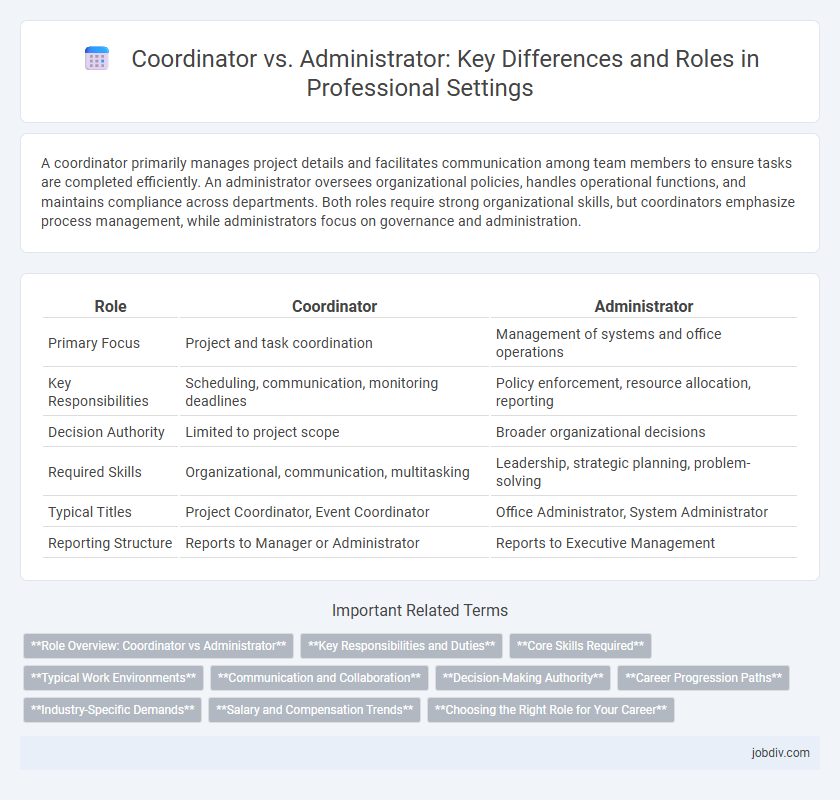A coordinator primarily manages project details and facilitates communication among team members to ensure tasks are completed efficiently. An administrator oversees organizational policies, handles operational functions, and maintains compliance across departments. Both roles require strong organizational skills, but coordinators emphasize process management, while administrators focus on governance and administration.
Table of Comparison
| Role | Coordinator | Administrator |
|---|---|---|
| Primary Focus | Project and task coordination | Management of systems and office operations |
| Key Responsibilities | Scheduling, communication, monitoring deadlines | Policy enforcement, resource allocation, reporting |
| Decision Authority | Limited to project scope | Broader organizational decisions |
| Required Skills | Organizational, communication, multitasking | Leadership, strategic planning, problem-solving |
| Typical Titles | Project Coordinator, Event Coordinator | Office Administrator, System Administrator |
| Reporting Structure | Reports to Manager or Administrator | Reports to Executive Management |
Role Overview: Coordinator vs Administrator
Coordinators primarily manage specific projects or teams, ensuring tasks align with organizational goals and deadlines, while administrators oversee broader operational functions such as policy implementation and resource management. Coordinators focus on facilitating communication and workflow within departments, whereas administrators handle administrative support, compliance, and strategic planning. The distinction lies in coordinators driving project execution and administrators maintaining organizational infrastructure and efficiency.
Key Responsibilities and Duties
Coordinators oversee project planning, resource allocation, and communication among team members to ensure smooth workflow and timely completion of tasks. Administrators manage organizational operations, including record-keeping, policy enforcement, and support services that facilitate overall efficiency. Both roles require strong organizational skills but differ in scope, with coordinators focusing on project-specific execution and administrators handling broader institutional management.
Core Skills Required
Coordinators require strong communication, organization, and multitasking skills to effectively manage schedules, resources, and team collaboration. Administrators must excel in problem-solving, administrative software proficiency, and data management to oversee operational functions and ensure compliance. Both roles demand attention to detail and the ability to prioritize tasks under tight deadlines.
Typical Work Environments
Coordinators typically work in dynamic office settings across industries such as marketing, healthcare, and event management, where collaboration and multitasking are essential. Administrators are often found in structured environments like schools, government agencies, and corporate offices, managing operational systems and organizational procedures. Both roles require strong organizational skills but differ in their focus on project facilitation versus administrative oversight.
Communication and Collaboration
Coordinators excel in facilitating clear communication and fostering collaboration among team members, ensuring project goals are aligned and information flows smoothly across departments. Administrators focus on managing organizational systems and processes, supporting communication through structured channels and maintaining documentation for accountability. Effective communication and collaboration in both roles drive operational efficiency and enhance team productivity in professional environments.
Decision-Making Authority
Coordinators typically have limited decision-making authority, focusing on organizing tasks and facilitating communication within teams to ensure project goals are met efficiently. Administrators possess broader decision-making power, managing resources, setting policies, and making strategic choices that impact organizational operations. Understanding the distinction in decision-making authority is crucial for defining roles and responsibilities in professional environments.
Career Progression Paths
A Coordinator typically focuses on specific projects or departmental tasks, gaining hands-on experience and developing specialized skills that lead to roles such as Project Manager or Team Leader. An Administrator usually manages broader organizational functions, building expertise in operations and strategic planning that can advance toward positions like Office Manager or Operations Director. Career progression paths for Coordinators often involve ascending within project management, while Administrators may move into higher-level administrative or executive roles overseeing multiple departments.
Industry-Specific Demands
Coordinators are often tasked with managing day-to-day project activities and ensuring team alignment, making them essential in industries with fast-paced workflows such as marketing and event planning. Administrators typically handle broader organizational responsibilities including compliance, budgeting, and policy implementation, which are critical in regulated sectors like healthcare and finance. Understanding these industry-specific demands helps define roles clearly, optimizing operational efficiency and resource allocation.
Salary and Compensation Trends
Coordinator roles typically offer a median salary ranging from $45,000 to $60,000 annually, with variations based on industry and experience, while Administrators generally command higher compensation, averaging between $60,000 and $85,000 per year due to greater responsibilities and management duties. Salary growth for Administrators tends to outpace Coordinators, driven by expanded skillsets and leadership demands within organizational structures. Compensation packages for both positions increasingly include performance bonuses and benefits such as health insurance and retirement plans, reflecting evolving market trends in professional roles.
Choosing the Right Role for Your Career
Selecting between a coordinator and an administrator role depends on your preferred scope of responsibilities and career aspirations. Coordinators often specialize in project management, team communication, and operational support, making it ideal for professionals seeking hands-on involvement in daily activities. Administrators typically handle organizational oversight, policy implementation, and strategic planning, suited for those aiming to advance in leadership and decision-making positions.
Coordinator vs Administrator Infographic

 jobdiv.com
jobdiv.com